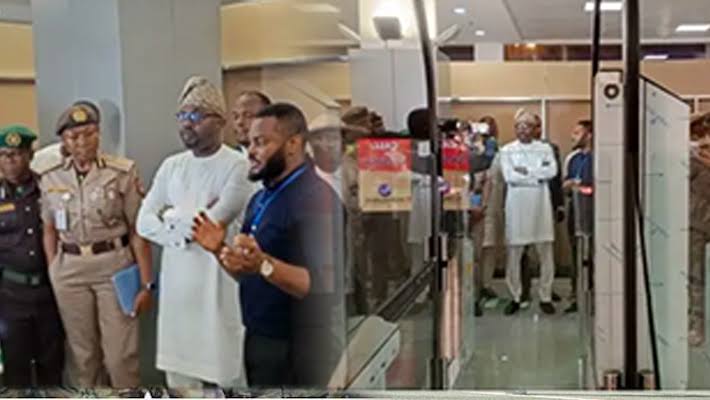The federal government, through the Nigeria Immigration Service (NIS), has begun installing e-gates at Murtala Muhammed International Airport (MMA) in Lagos.
This initiative aims to bolster national security, facilitate passenger processing, and improve ease of business operations.
The NIS also revealed that over 107,000 passports remain uncollected by applicants.
During an inspection of the newly installed e-gate at the arrival section of Lagos airport on Friday, Minister of Interior Olubunmi Tunji-Ojo stated that the installation at Nnamdi Azikiwe Airport in Abuja is already 100% complete.
“Lagos has three wings. This is Terminal 2. We have the D and E wings. Now you see that the gates have been installed. What they are doing now is called the User Acceptance Test (UAT) which is the last stage and by Monday morning, this wing will have been completed 100 per cent. As it is, it is already installed. So, we just need to align the sensor,” Tunji-Ojo explained.
He added, “From here, we will move to the D Wing which has four gates because we can’t block the three entrances at the same time. We can’t work simultaneously because of the ease of passengers. So, we have to be taking them one after the other.
“The assurance we have is that by next weekend, the D Wing will have been fully completed. We will then be left with the E wing which has eight gates. This may take us another maximum of two weeks.
“In the next three weeks from now, Lagos will be 100 per cent good to go, then we will move to other airports like Kano, Enugu and Port Harcourt which each have four gates. These will be faster. Lagos airport alone has 21 gates. Lagos is where you have the major traffic.”
Tunji-Ojo emphasized the importance of e-gates in enhancing national security, noting their connection to global databases.
He said, “When you travel to New York and you get to JFK, as a foreigner, you are on the queue. An American carries his passport and goes in easily. That gives him lots of confidence that he is in his country. This is called sweet experience and this president is bent on giving Nigerians the sweet experience.
“It is about changing the narrative and telling us that things we see in other places can work in Nigeria.”
He also mentioned that the project is a public-private partnership and part of a broader border control management solution.
Automated border control systems (ABC) or e-gates are self-service barriers that use biometric data stored in passports, combined with a photo or fingerprint taken at the e-gate, to verify a traveler’s identity.
The process involves biometric verification through facial or iris recognition, fingerprints, or a combination of these methods.
Upon successful verification, a gate or turnstile opens to allow passage. If verification fails or the system malfunctions, access is denied.
